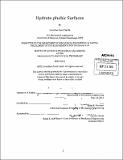Hydrate-phobic surfaces
Author(s)
Smith, Jonathan David, S.M. Massachusetts Institute of Technology
DownloadFull printable version (2.182Mb)
Other Contributors
Massachusetts Institute of Technology. Dept. of Mechanical Engineering.
Advisor
Kripa K. Varanasi.
Terms of use
Metadata
Show full item recordAbstract
Clathrate hydrate formation and subsequent plugging of deep-sea oil and gas pipelines represent a significant bottleneck for ultra deep-sea production. Current methods for hydrate mitigation focus on injecting thermodynamic or kinetic inhibitors into the flow, heating the pipe walls, or managing the flow of formed hydrates. These methods are expensive and energy intensive. An alternative approach involves reducing the adhesion of hydrates to surfaces, ideally to a low enough level that the force of flow detaches them and prevents plug formation. Systematic and quantitative studies of hydrate adhesion on smooth surfaces with varying energies were conducted. Surface energies were quantified using van Oss-Chaudhury-Good analysis of advancing and receding contact angles of polar and nonpolar fluids. The strengths of hydrate adhesion to these surfaces were measured using a custom-built testing apparatus, and greater than 75% reduction in adhesion strength of Tetrahydrofuran hydrate was achieved on treated surfaces compared with bare steel. This reduction is achievable on surfaces characterized by low Lewis acid, Lewis base, and van der Waals contributions to surface free energy such that the work of adhesion is minimized. Hydrate adhesion strength was correlated with the practical work of adhesion, i.e. with [gamma]₁(1 + cos [theta]rec) , of a suitable probe fluid, that is, one with similar surface energy properties to those of the hydrate. These fundamental studies provide a framework for the development of hydrate-phobic surfaces, and may lead to passive enhancement of flow assurance and prevention of blockages in deep-sea oil and gas operations.
Description
Thesis (S.M.)--Massachusetts Institute of Technology, Dept. of Mechanical Engineering, 2011. Cataloged from PDF version of thesis. Includes bibliographical references (p. 25-27).
Date issued
2011Department
Massachusetts Institute of Technology. Department of Mechanical EngineeringPublisher
Massachusetts Institute of Technology
Keywords
Mechanical Engineering.